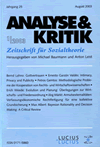Suchergebnisse
"Peter Schaber"
Titel: Wieso moralische Achtung wichtig ist
Autor: Peter Schaber
Seite: 351-361
Abstract: Bittner argues in his paper that the idea of a general duty to respect persons is of much less importance than some moral philosophers think. If respect plays a role in our lives it is mainly appriciation respect persons have to merit. Respecting persons as such is, Bittner thinks, not just irrelevant, but also incompatibel with personal relations. Against this it is argued that respect for persons should be seen as the basic moral duty we have towards persons. And in addition, it is argued, that you can only be a proper friend of someone, if the relation to her or him is based on moral respect.
Titel: Achtung und ihre moralische Bedeutung: Erwiderung auf Peter Schaber
Autor: Rüdiger Bittner
Seite: 363-365
Abstract: The present reply to Peter Schaber’s critique of my paper Achtung und ihre moralische Bedeutung argues, first, that Schaber has no good grounds for maintaining that we have an obligation to respect every human being. Second, it explains why respect is not a fruitful attitude to take in the face of social divisions.
Titel: Altruism and the Indispensability of Motives
Autor: Mark S. Peacock / Michael Schefczyk / Peter Schaber
Seite: 188-196
Abstract: In this paper we examine Fehr's notions of "altruism", "strong reciprocity" and "altruistic punishment" and query his ascription of altruism. We suggest that, pace Fehr, altruism cannot be de ned behaviourally because the de nition of altruism must refer to the motives of actors. We also advert to certain inconsistencies in Fehr's usage of his terms and we question his explanation of altruism in terms of 'social preferences'.
Titel: Four Charges Against the WTO
Autor: Mark S. Peacock / Michael Schefczyk / Peter Schaber
Seite: 275-284
Abstract: My comment on the third chapter of Peter Singer's One World consists of two parts. In the first, I criticise a common but simplistic approach to the issue of economic globalisation. This approach presumes that charges against the WTO can be translated - more or less directly - into charges against current development trends of the global economy. The WTO is not the only institution that legally structures the global economy, nor are decisions of the GATT or WTO panel necessarily reliable indicators of the major trends in the ever more integrated world market. It is, moreover, far from clear whether competition between jurisdictions leads to a 'race to the bottom'. In the second part of the paper, I (i) criticise the idea of a general conflict between 'the market' and 'democracy'. (ii) I defend the WTO's consensus rule against Singer's charge of being 'a very strange view of democracy' and try to make its benefits clear.
Titel: Normative Handlungsgründe
Autor: Peter Schaber
Seite: 25-40
Abstract: t is a widely held view in moral philosophy that reasons for action are based on desires. This view should be rejected. Reasons for action are never provided by desires. Desires provide us with motives, whereas reasons for action are based on valuable facts which obtain independently of our desires. The recognition of these reasons does not necessarily motivate us. Motives depend on desires, for instance the motive for moral actions on the desire to do the morally right thing.
Titel: Sind alle Werte vergleichbar? Kosten-Nutzen-Analyse und das Inkommensurabilitätsproblem
Autor: Peter Schaber
Seite: 153-165
Abstract: Are the values of different options and goods, as cost-benefit analysis assumes, commensurable? Not always. The incommensurability of certain options is based on the fact that preferences are sometimes not rankable, even if the agent is fully informed about the options in question. In addition, even if all values were commensurable they could not be compared in monetary terms. If this is the case, cost-benefit analysis should not be seen as a decision procedure.

Ernst Fehr on Human Altruism. An Interdisciplinary Debate
2005 (27) Heft 1
Editorial
In the foregoing decade, two related developments in the behavioural sciences have drawn the attention of social scientists, particularly economists. The first is the use of laboratory experiments in the investigation of human behaviour. Although the use of such experiments has a longer history, only in the last decade has ’experimental economics’ become a sub-discipline of economics with which economists of just about all colours are familiar; indeed, experimental results regularly feed int...

Kosten-Nutzen-Analyse und Umweltgüter / Cost-Benefit Analysis and the Environment
1994 (16) Heft 2
Editorial
Die Kosten-Nutzen-Analyse ist eine in den verschiedensten Bereichen der Politik angewandte Methode, um bürokratische und planerische Entscheidungen zu unterstützen. In ihren wissenschaftlichen Grundlagen entstammt die Kosten-Nutzen-Analyse der Ökonomie. Ihre Verwender verfolgen die Absicht, die Theorie des idealen Marktes auf solche Güter und ihre Nutzung zu erweitern, für die es keinen realen Markt gibt. So sollen öffentliche Güter, wie etwa die natürliche Umwelt, mit Hilfe der Kosten-N...